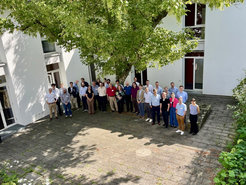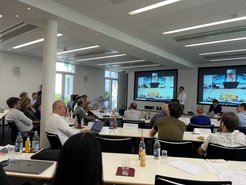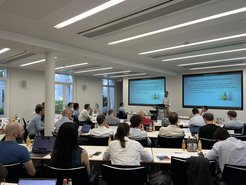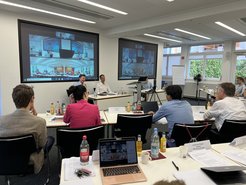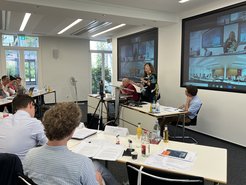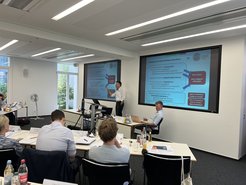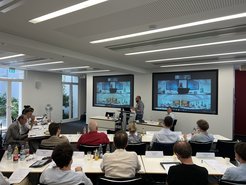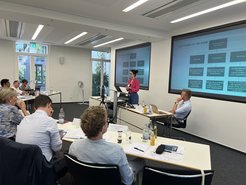
Criminalising Carelessness? – Comparative and Interdisciplinary Perspectives on Criminal Liability for Inadvertent Negligence
Workshop • August 29–31, 2024 • Freiburg/Germany
Max Planck Institute for the Study of Crime, Security and Law
Can we punish people for crimes they didn’t even know they committed? Ultimately, the answer to this question lies at the core of criminal liability for inadvertent negligence. But legal systems respond very differently. Although most civil law jurisdictions seem to have no problem with criminal liability for inadvertent negligence, its criminalisation is controversial in common law jurisdictions. And even though most Anglo-American criminal law theorists firmly hold onto the principle of actus non facit reum, nisi mens sit rea, criminal liability for negligence, and even strict liability, is becoming inexorably widespread in statutory law. Surprisingly, despite the subject having been long discussed in Anglo-American and German criminal law scholarship, there has been scant exchange between them, and the two legal systems have benefited too little from each other’s insights.
From 29–31 August 2024, we addressed this issue and the different perspectives on criminal liability for inadvertent negligence in a workshop organized by the Max Planck Institute for the Study of Crime, Security and Law, Freiburg. Cutting through the fields of philosophy, psychology, and criminal law theory, the workshop focused on the theoretical, doctrinal, and practical issues of inadvertent negligence. A special emphasis was placed on the question of what we are accusing the offender of: What is criminally wrong about being careless, and is this criminal charge tenable from a legal and even from a philosophical and psychological point of view? By bringing together scholars from different civil and common law jurisdictions, the workshop provided a platform for a lively international and interdisciplinary debate on these questions and sought to provide new answers to an old problem.
Program
| Wednesday, 28 August 2024 | |
|---|---|
| – Arrival – |
| Thursday, 29 August 2024 | |
|---|---|
| 09:15–10:00 | Registration |
| 10:00–10:15 | Philipp-Alexander Hirsch (Freiburg) Welcome and Introduction |
| 10:15–11:15 | Gunnar Duttge (Göttingen) Fundamental Questions on Inadvertent Negligence from the Perspective of German Criminal Law |
| 11:15–12:15 | Mark Dsouza (London) Chosen Negligence |
| 12:15–13:45 | – lunch break – |
| 13:45–14:45 | Veronica Rodriguez-Blanco (Surrey) Settling the Terms for Understanding Negligent actions: Two Models of Deliberation |
| 14:45–15:45 | Boris Burghardt (Marburg) Inadvertent Negligence and Moral Luck |
| 15:45–16:15 | – coffee break – |
| 16:15–17:45 | Manuel Cordes (Freiburg) The Semantics of Avoidability Alexander Greenberg (Southampton) Could Have Known Better |
| 18:30 | – dinner (speakers only) – |
| Friday, 30 August 2024 | |
|---|---|
| 09:30–11:00 | Jan Rummel (Heidelberg) Remembering Intentions: A Special Cognitive Challenge Johannes Stefan Weigel (Göttingen & Freiburg) The (Un)Avoidability of Negligence |
| 11:00–11:30 | – coffee break – |
| 11:30–12:30 | Heidi Hurd (Illinois) & Michael Moore (Illinois) The Non-Punishability of Negligence |
| 12:30–14:00 | – lunch – |
| 14:00–15:00 | Jan C. Schuhr (Heidelberg) Two Models of Carelessness: Extraordinary Imputation vs. Breach of Duty |
| 15:00–16:00 | Findlay Stark (Cambridge) Constrained Negligence |
| 16:00–16:30 | – coffee break – |
| 16:30–17:30 | Svenja Schwartz (Freiburg) Unconscious Negligence from the Perspective of Functionalism |
| 18:00 | – dinner (speakers only) – |
| Saturday, 31 August 2024 | |
|---|---|
| 09:30–10:30 | Malcolm Thorburn (Toronto) Against the Criminalization of Inadvertent Negligence – a State-Centric Account |
| 10:30–11:00 | – coffee break – |
| 11:00–12:00 | Morten Boe (Freiburg) Criminal Negligence and the Constitution – A Canadian-German Perspective |
| 12:00–13:00 | Georgia Stefanopoulu (Hannover & Leipzig) Should We be Less Careless with Carelessness? |
| 13:00 | Closing Remarks |
| 13:15 | – restaurant (speakers only) – |
| Sunday, 1 September 2024 | |
|---|---|
| – Departure – |
Next Steps
The conference contributions are slated for publication in a high-profile edited volume, which will bring together the core theses and controversies surrounding the criminal liability for unconscious negligence and enrich them with new perspectives.
About us

The workshop is organized by Dr. Dr. Philipp-Alexander Hirsch and Johannes Stefan Weigel.
Johannes Stefan Weigel is a PhD student at the Chair of Prof. Dr. Uwe Murmann at the Georg-August-Universität Göttingen and a member of the Independent Research Group “Criminal Law Theory”. His dissertation deals with the topic of Criminalization of Inadvertent Negligence which inspired this workshop.
Philipp-Alexander Hirsch is Leader of the Independent Research Group “Criminal Law Theory” at the Max Planck Institute for the Study of Crime, Security and Law in Freiburg. His research focuses on criminal law and criminal procedure, legal philosophy and legal theory, and the history and philosophy of criminal law in the Age of Enlightenment.
The Max Planck Research Group “Criminal Law Theory” focuses on the analysis of substantive criminal law and criminal procedure and the doctrine in these areas; the analysis centers on the underlying normative structures and principles in order to assess their coherence, justifiability, and persuasiveness. The aim is to draw on the fruits of this analysis to engage in normative theory-building that proposes solutions to problems in criminal law that go beyond interpreting the positive law.
Summary and Gallery
From August 29 to 31, 2024, the “Criminal Law Theory” research group at the Max Planck Institute for the Study of Crime, Security, and Law in Freiburg hosted the conference “Criminalising Carelessness? – Comparative and Interdisciplinary Perspectives on Criminal Liability for Inadvertent Negligence.” It provided a lively forum for international and interdisciplinary exchange on the question of whether, and to what extent, inadvertent negligence may and should be subject to criminal responsibility.
The presentations approached the topic from various angles—ranging from doctrinal and constitutional foundations to psychological and moral-philosophical considerations. They focused particularly on whether criminal responsibility and culpability can be attributed to an offender who lacks any awareness of their own wrongdoing. Central to the discussions were reflections on the conditions under which negligent acts can be imputed to an individual and on the requirements that a liberal legal order places on the foreseeability and preventability of harmful behavior.
The interdisciplinary dialogue underscored the complexity of the interplay among individual cognitive abilities, ethical and legal principles, and institutional frameworks. By comparing different legal systems, participants were also able to highlight similarities and differences in how unconscious negligence is treated.
The conference contributions are slated for publication in a high-profile edited volume, which will bring together the core theses and controversies surrounding the criminal liability for unconscious negligence and enrich them with new perspectives.
